Tata Institute for Genetics and Society
- About Us
- Research
- Faculty
- Active Genetics
- Capacity Building
- News & Events
- Jobs
Building India’s scientific capacity, especially as it relates to active genetics research, is a key tenet of the TIGS mandate. Supporting the objectives of TIGS-India, the TIGS-UC San Diego program continues to integrate the efforts of visiting Indian scholars in laboratory research and scholarly collaboration. Currently, TIGS-UC San Diego is training 11 TIGS visiting scholars, four of whom have completed their two-year training terms and will travel back to TIGS-India in the summer of 2020 to continue their research projects at TIGS-India. Here are biographies of the visiting scholars:
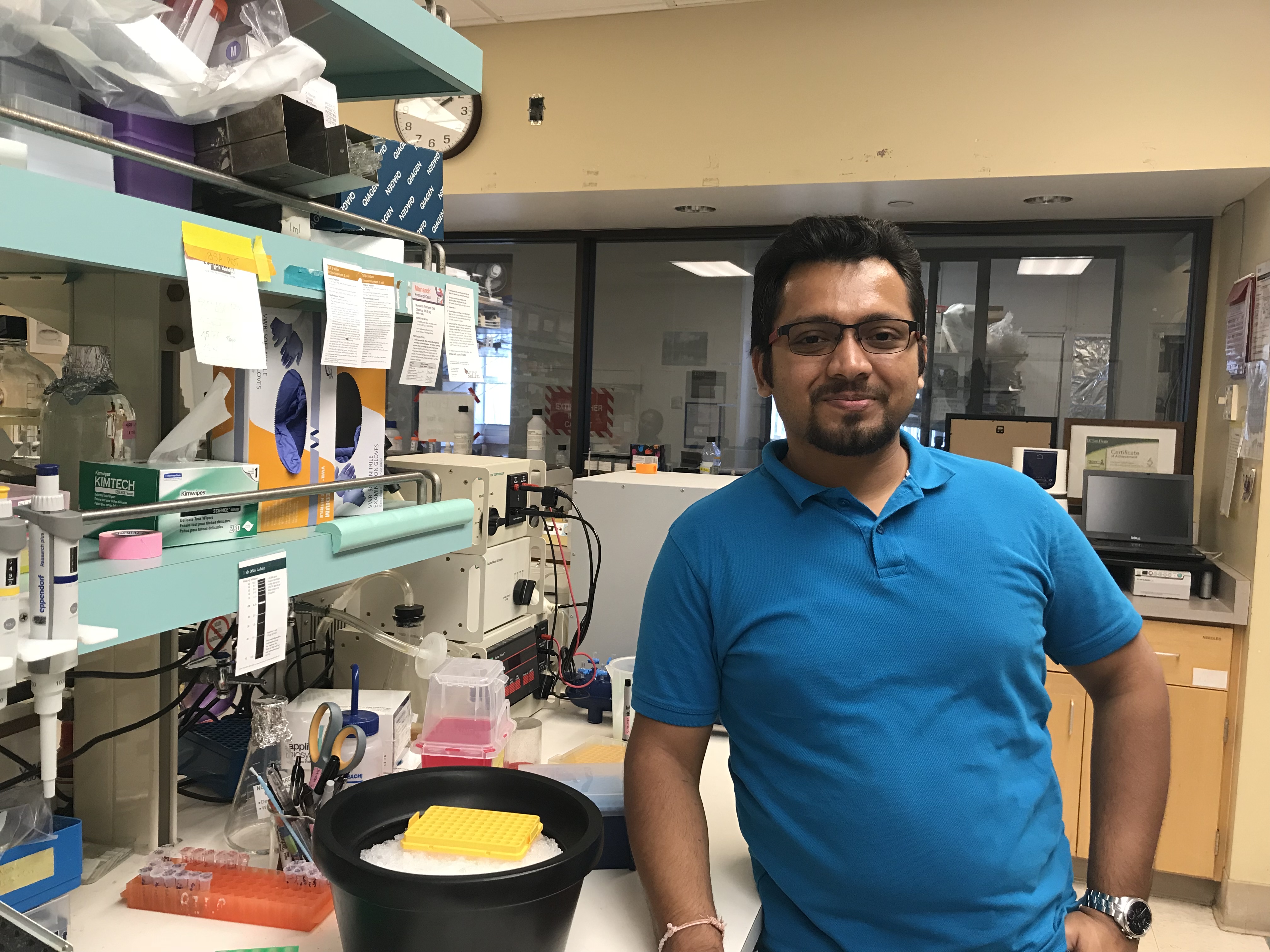 Sabyasachi Pradhan
Sabyasachi PradhanSabyasachi Pradhan received his PhD in parasitology from Jawaharlal Nehru University, India. During his tenure, he worked with both human and rodent malaria parasites to investigate the role of proteins involved in DNA replication of the parasites. Pradhan’s current research objectives revolve around establishing a robust parasite challenge assay system to determine the efficacy of various anti-malarial effector molecules being developed at both TIGS-UC San Diego and TIGS-India. To achieve this goal, Sabyasachi contributed significantly to establishing an in vitro parasite-vector interaction system in the laboratory of Professor Ethan Bier, where effector molecules could be introduced and analyzed for their effect on the parasite within the mosquito host. With additional optimization, output from this in-house parasite challenge assay will enable the team at TIGS-UC San Diego to select the best-performing effector molecules to be introduced into mosquitoes using the gene drive system, which will allow the mosquito to defeat the parasite from within.
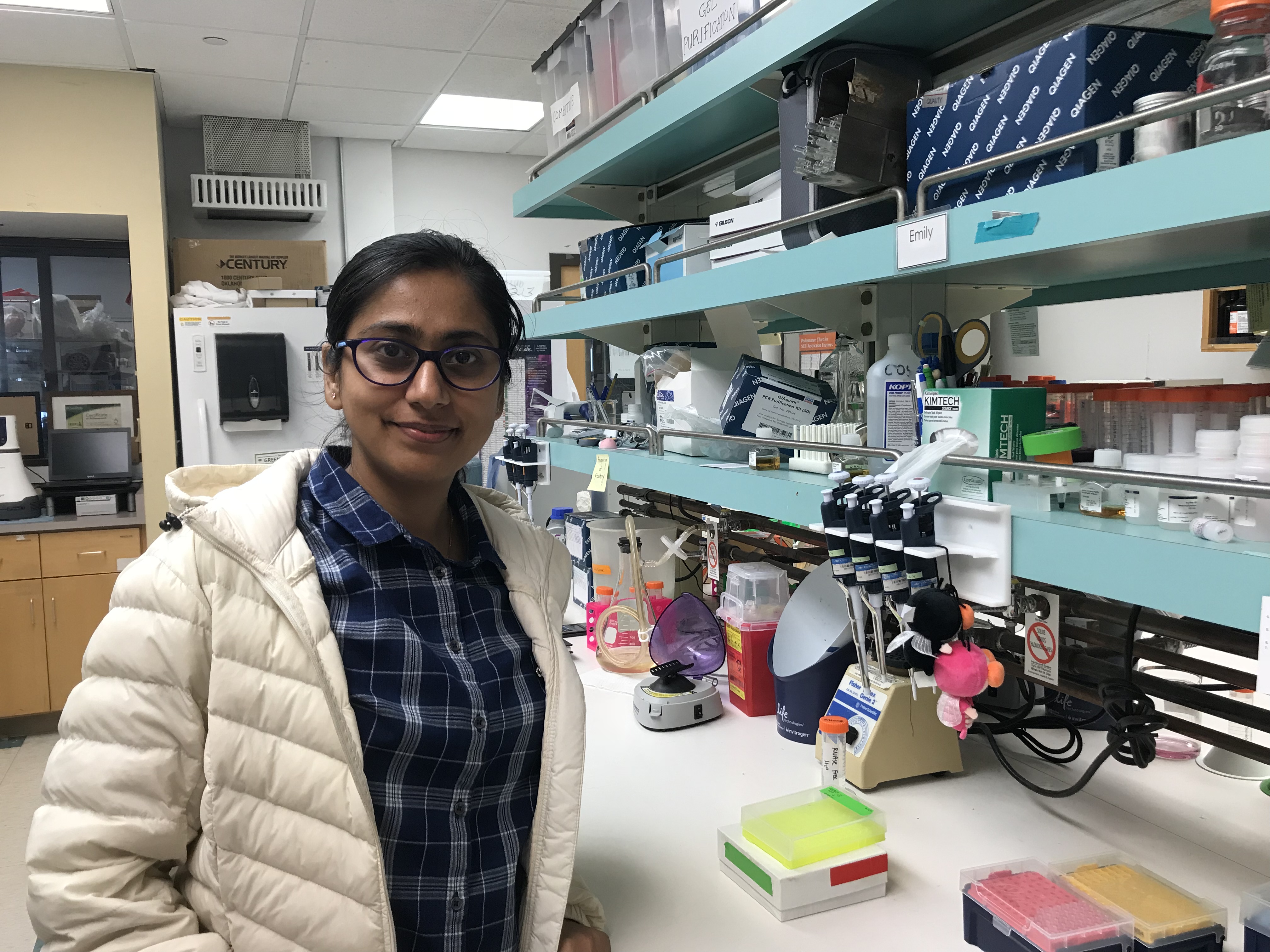 Harvinder Kour Khera
Harvinder Kour KheraHarvinder Kour Khera received her PhD (life sciences) from the CSIR-funded Indian Institute of Integrative Medicine, Jammu and Kashmir, India, and joined TIGS in May 2018. Khera is focused on a project titled “strategies for developing new anti-malarial effectors” with a focus on the malaria parasites P. vivax and P. falciparum. During her stay with TIGS-UC San Diego, working with Professor Ethan Bier and Professor Geoffrey Chang, Khera produced multiple antigens present on the surface of the malaria parasites, as well as effector molecules (single chains, nanobodies and monoclonal antibodies). She is working to identify the best effector molecules that would recognize the specific parasite antigens and disable the parasite. Once identified, the effector molecules will be tested for their ability to block the parasite survival in mosquitoes using the parasite challenge assay. The long-term goal of her work is to generate single effector molecules that would act to disable both P. vivax and P. falciparum parasites.
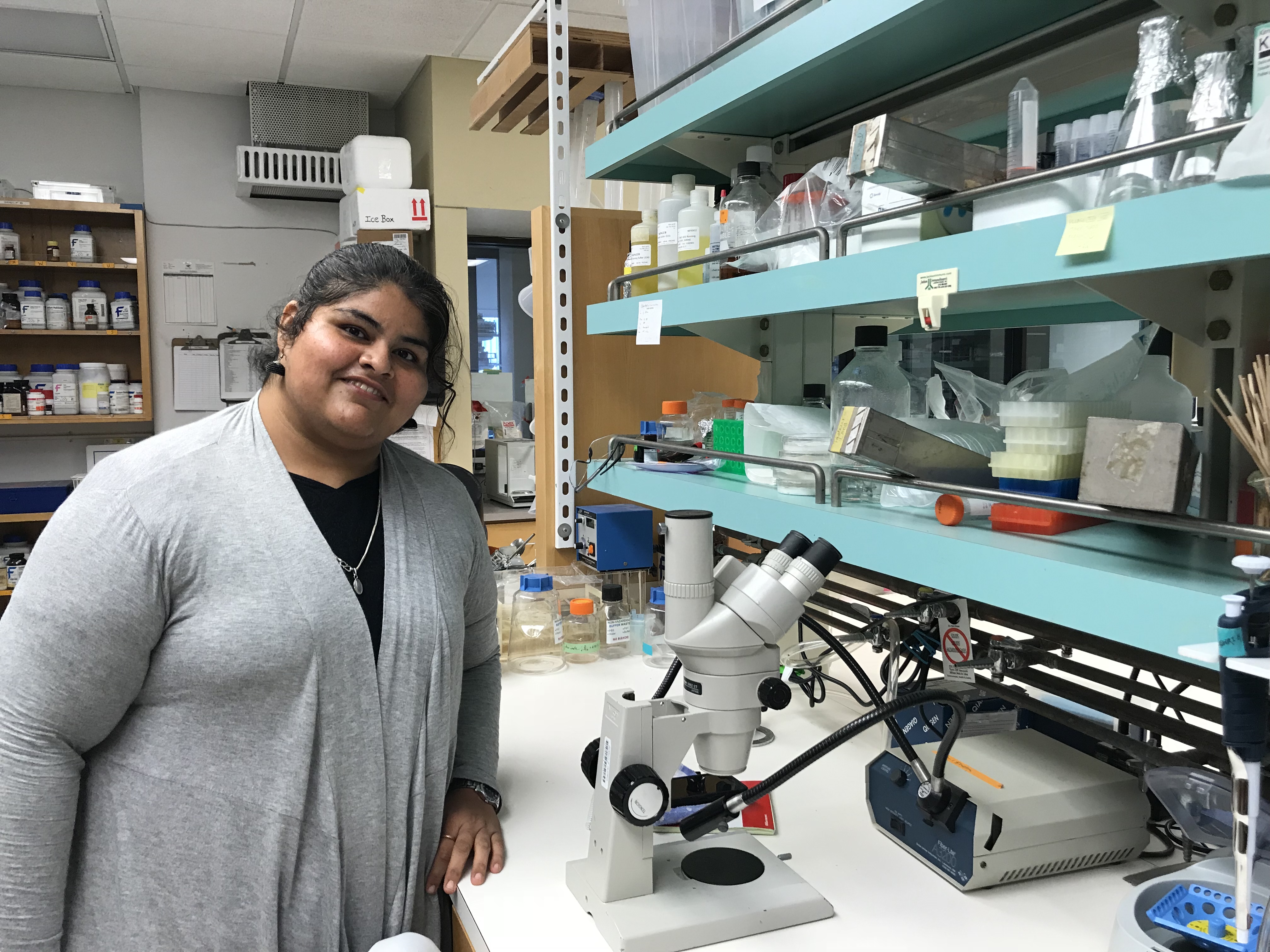 Mansi Rajendra Malik
Mansi Rajendra MalikMansi Rajendra Malik obtained her PhD at Haffkine Institute for Training, Research and Testing, Mumbai, India. Her research focused on understanding the pathophysiology of malaria in the context of oxidative stress and metallomics, a project awarded by the Indian Council of Medical Research. Mansi joined TIGS in May 2018, and begin her training with Professor Ethan Bier at UC San Diego. Mansi’s work is focused in three areas: 1) Design and creation of highly efficient gene-drive systems that, when combined with antimalarial effector proteins in Anopheles mosquitoes, could prevent malaria transmission; 2) Evaluation of antimalarial effector candidates that are specific to the sexual stages of parasite development; and 3) Design of experiments to assess the ability of the malaria parasite to evolve and gain resistance to the anti-malarial effector molecules. The parasite evolution project is the primary focus of Mansi’s research, and will continue when she transitions back to TIGS-India.
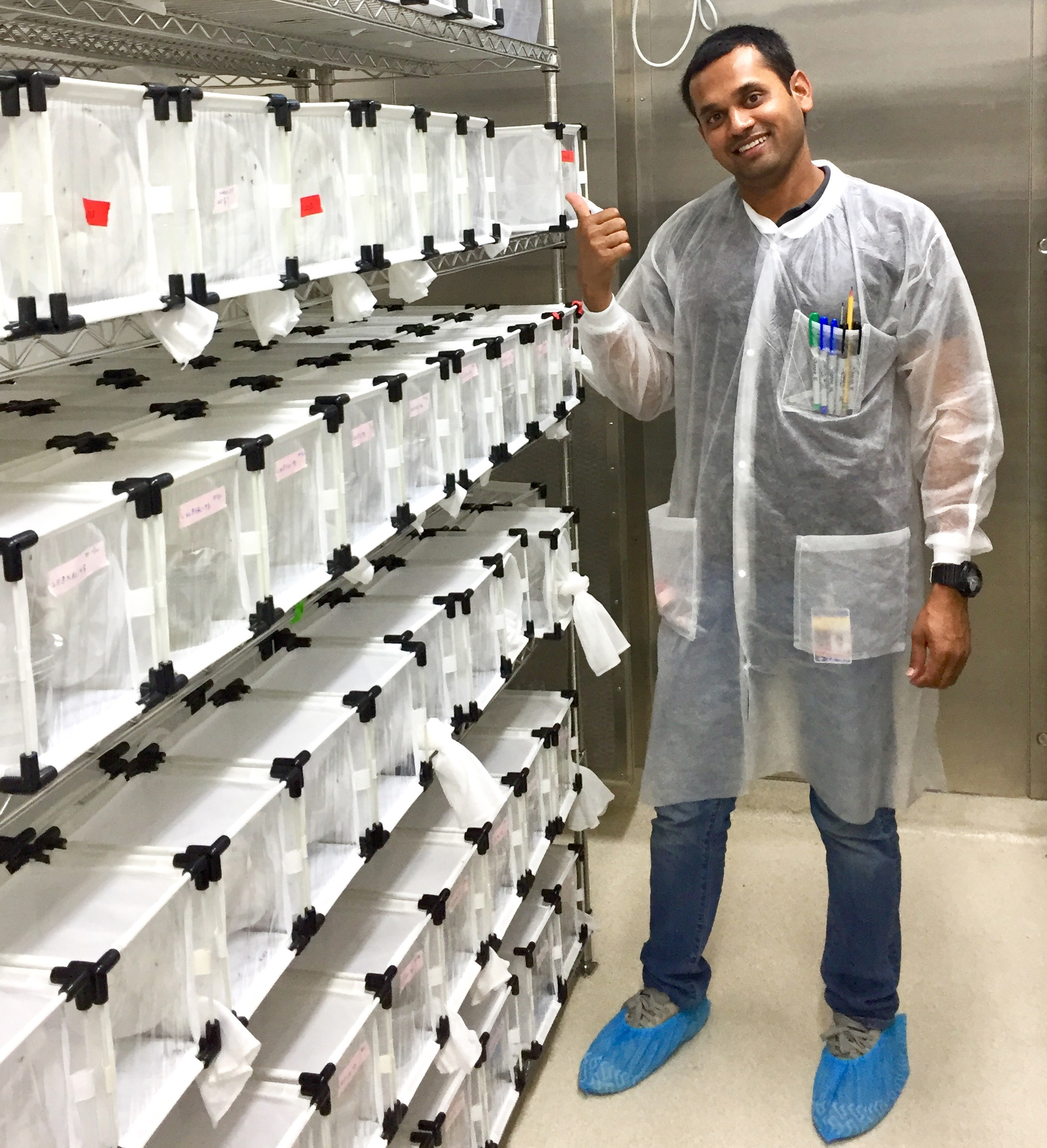 Jyotheeswara Reddy Edula
Jyotheeswara Reddy EdulaJyothi Edula joined the laboratory of Associate Professor Omar S. Akbari at UC San Diego in July 2018. He is currently developing novel technologies to suppress or replace the Aedes aegypti populations, such as CRISPR-mediated gene drives and precision-guided Sterile Insect Technique (pgSIT) to limit the spread of vector-borne diseases (Zika, dengue, chikungunya and yellow fever). To suppress the Aedes population by novel pgSIT strategy, genes important for male fertility, female viability, and flight were targeted, resulting in sterile males, intersex, doublesex and flightless females, respectively, in a single generation. In confinable split-gene drive strategy, the team targeted female fertility and doublesex genes that affect female reproduction resulting in sterile females, and in both strategies, doublesex females are unable to bite. Simultaneously, work is being conducted on a population replacement strategy, which involves replacing all of the disease-carrying mosquitoes in one area with disease-resistant mosquitoes. Edula received his B.S. in Medical Lab Technology and M.S. in Biotechnology from Indian Universities. Initially, he was a research fellow and later in 2013 he received his PhD in Biotechnology from Jawaharlal Nehru Tech University, India. He spent two years as a research associate at ICGEB, India, and in 2013, he moved to Japan to pursue his research career at RIKEN and Osaka University, respectively. Before joining TIGS, Edula served for several years as a research scientist at the Research Institute for Microbial Diseases (RIMD) at Osaka University, Japan, where he worked on the basic biology of malaria parasites and vaccine development.
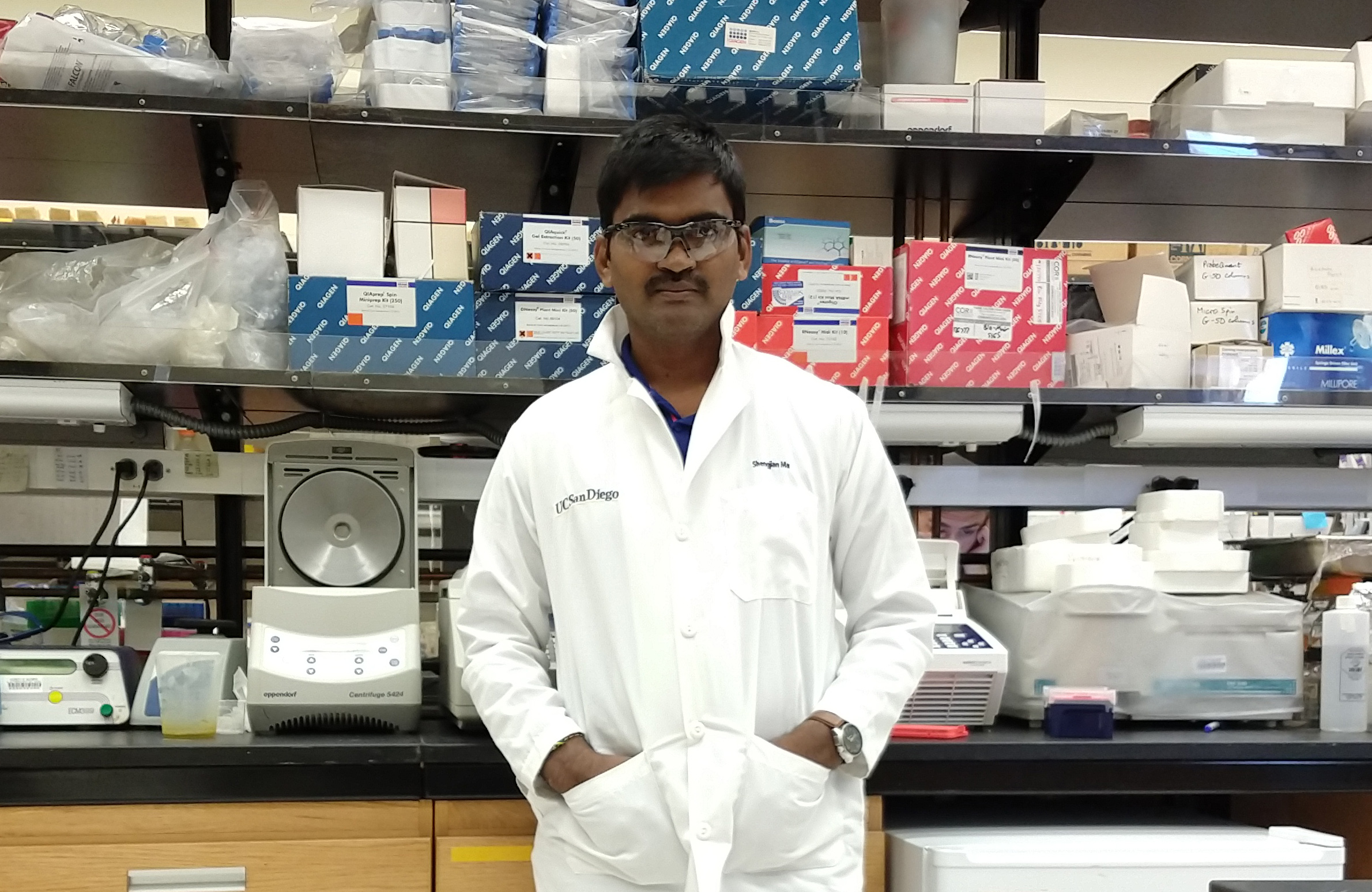 Rambabu Ratnala
Rambabu RatnalaRambabu Ratnala received his PhD in biotechnology from Jawaharlal Nehru Tech University, Hyderabad, India. His doctoral research work, carried out at ICAR-Indian Institute of Rice Research, Rajendra Nagar, Hyderabad, focused on improvement of blast resistance in the genetic background of elite rice varieties samba mahsuri, swarna and improved samba mahsuri through marker-assisted backcross breeding approaches. Prior to his PhD studies, Rambabu worked as senior research fellow on an ICAR project, and after completion of his doctoral degree he worked as a research associate at the International Crops Research Institute for the Semi-Arid Tropics (ICRISSAT, Patancheru) for one year in the Cambridge-Indian Network project for Translational Research in Nitrogen-Use Efficiency with Dr. Rajeev Gupta. Rambabu joined TIGS in November 2018, and is working in Professor Yunde Zhao's laboratory, where his research is focused on implementation and applications of active genetics in rice.
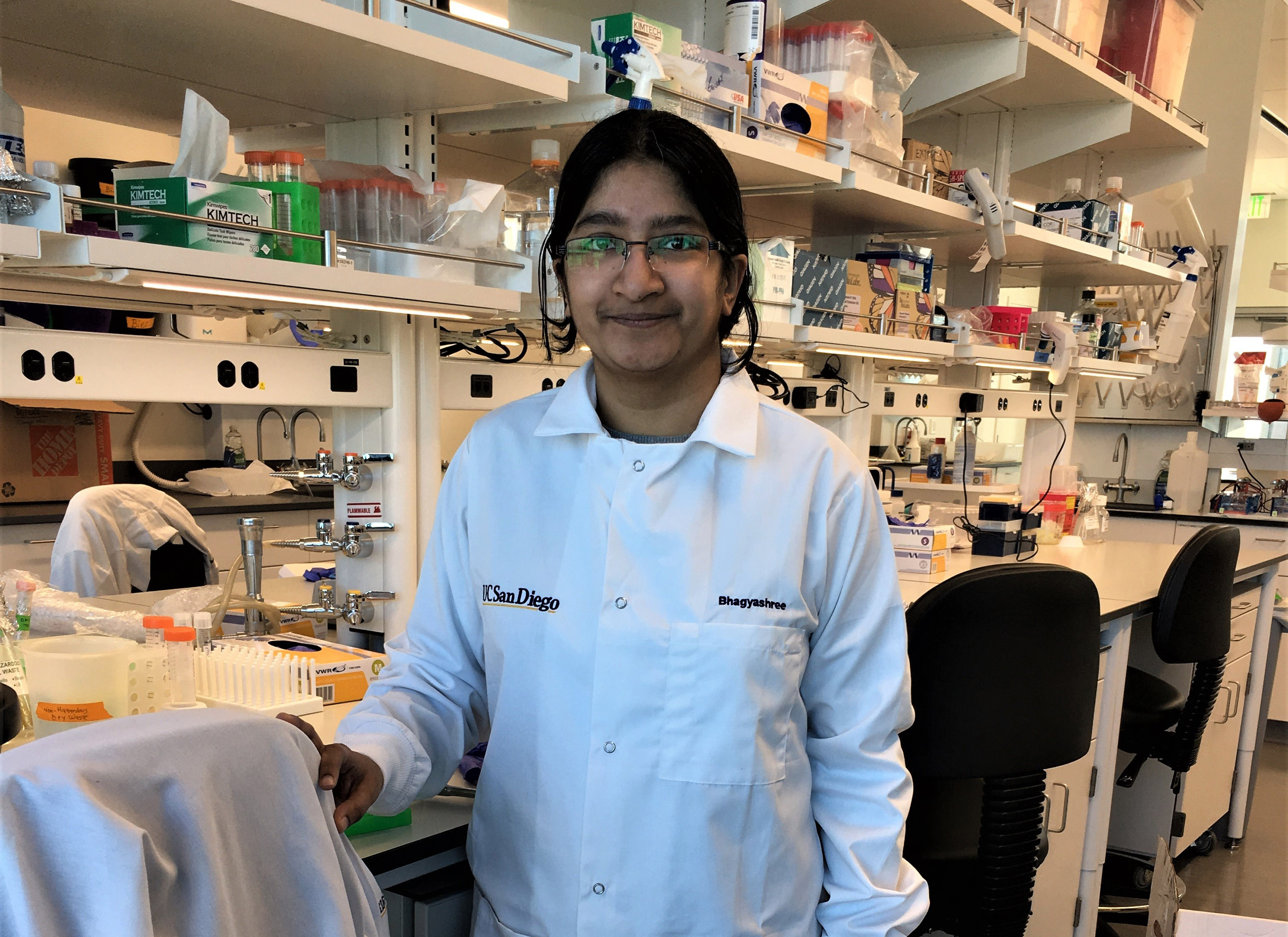 Bhagyashree Kaduskar
Bhagyashree KaduskarAfter obtaining her master’s degree in biochemistry from M.S. University, Baroda, Bhagyashree Kaduskar joined the graduate program at the Indian Institute of Science Education and Research (IISER) Pune where she worked in the laboratory of Dr. Girish Ratnaparkhi on investigating regulation of the IMD pathway by SUMOylation. In a collaborative project, she explored the mechanistic link between Drosophila methyltransferase and immune response regulation. Bhagyashree joined Professor Ethan Bier's laboratory, where she is exploring the use of active genetics on metabolic genes involved in insecticide resistance in Drosophila and in Anopheles mosquitoes.
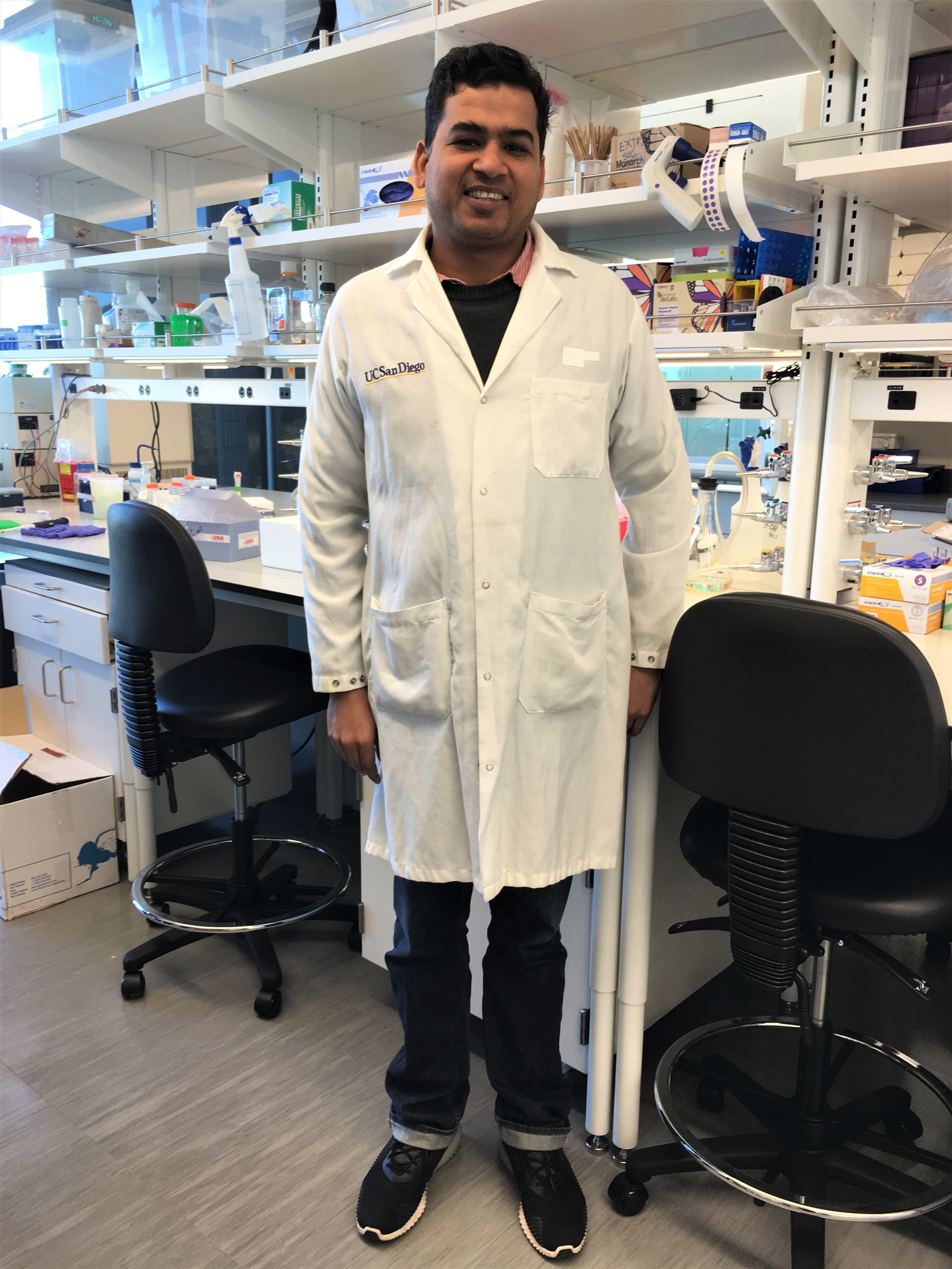 Jay Prakash Shukla
Jay Prakash ShuklaJay Prakash Shukla completed his master’s degree in biotechnology from Pondicherry University, India. During his studies, he was particularly fascinated by the mechanisms through which the various building blocks of life interact and give rise to a fully functional organism. His curiosity led him to join Professor Shashidhara's lab at the Indian Institute of Science, Education and Research (IISER), Pune, India, for his doctoral studies, wherein he worked on how differential cell-signaling shapes sensory organ fate in the fruit fly. He then joined Dr. Nitin Gupta's lab at the Indian Institute of Technology (IIT), Kanpur, India, where he worked on understanding the olfactory system of Aedes aegypti. Here, he established the molecular genetics set up to generate transgenic lines of Aedes aegypti using the CRISPR Cas-9 method. While working on gene editing technology, he became intrigued by the potential of gene drive in controlling mosquito populations, which in January 2019 led to his joining the laboratory of Professor Ethan Bier under the TIGS program. Here, Prakash aims to devise a mechanism to detect the presence of the malaria parasite in the Anopheles mosquitoes using cell signaling mechanisms.
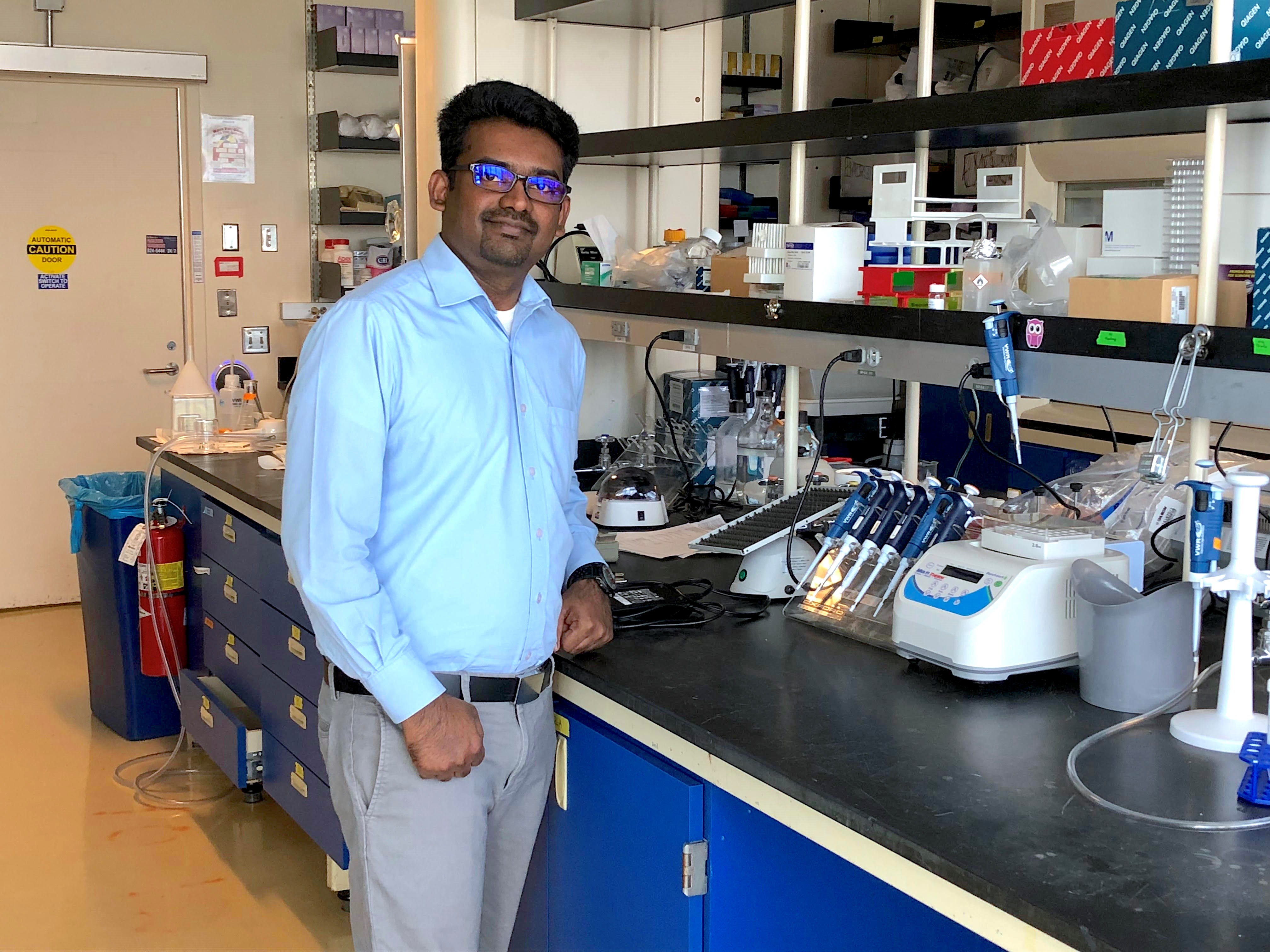 Arunachalam Ramaiah
Arunachalam RamaiahArunachalam Ramaiah joined the laboratory of Assistant Professor J.J. Emerson at UC Irvine in February 2019. He received his PhD in bioinformatics jointly from the Manonmaniam Sundaranar University, India, and Abo Akademi University, Finland, in 2012. In 2016, Ramaiah received the highly prestigious ISID New Investigator Award from the International Society for Infectious Diseases, USA, for his research on T-cell epitope evolution in Mycobacterium tuberculosis strains circulating in India. Before joining TIGS, he worked as a visiting researcher in the laboratory of Professor Annadurai Gurusamy at Manonmaniam Sundaranar University studying the influenza A/H7N9 virus, followed by completion of postdoctoral research in the laboratory of Professor Annapurna Vyakarnam at the Indian Institute of Science/King's College London studying Mycobacterium tuberculosis. Ramaiah then worked as an APHL-CDC bioinformatics postdoctoral fellow in the laboratory of Supervisory Microbiologist Gregory Dasch at the U.S. Centers for Disease Control and Prevention studying arthropod metagenomics and as a senior postdoctoral scholar in Professor Kari Nadeau’s laboratory at the Stanford University School of Medicine focusing on food allergy. As a part of his project, Ramaiah has assembled a reference-grade high-quality genome of Asian Malaria Mosquito Anopheles stephensi, predicted gold-standard genes and discovered the genome landscape and associated chromosomal structural variants. Ramaiah’s current research focuses on studying the sequence and structural organization of the An. stephensi heterochromatin, including the Y-chromosome. His investigation provides new avenues for control of the vector and the reduction of the public health and economic burdens in India and around the world.
 Iliyas Rashid
Iliyas RashidIliyas Rashid received his master of science in bioinformatics from Jamia Millia Islamia, New Delhi, in 2006. He carried out his doctoral thesis work at ICAR-National Bureau of Fish Genetic Resources (ICAR-NBFGR), India, and received his PhD degree in biotechnology with a specialization in computational genomics from AMITY University, Uttar Pradesh, India, in 2018. Rashid worked as a research associate/fellow in ICAR-NBFGR from July 2010 to June 2019 in a nationwide project at Centre for Agricultural Bioinformatics, India. He joined the Vector Genetics Laboratory of Professor Gregory Lanzaro at UC Davis as a TIGS visiting scholar in July 2019, and spent his first-year working on population genomics of malaria vectors collected from different parts of Africa. He performed marker-associated studies in Anopheles mosquitoes using computational genomics and bioinformatics applications. Currently, he is evaluating the spontaneous mutation rates per generation in the malaria vector using high-depth genome sequencing.
Sanjay Lamba joined the laboratory of Professor John M. Marshall at UC Berkeley in June 2019. He received his PhD in mathematical and computational biology from the Central University of Rajasthan, India, where his doctoral research work focused on modeling of regulation of nitrogen metabolic pathways under the supervision of Dr. Amit Chakraborty. Before joining TIGS, he worked as a research associate at Birla Institute of Technology and Science, Pilani, where his research focused on mathematical modeling and analysis of the dynamics of diabetes mellitus in Indian populations, and control measures. His current research focuses on the mathematical and computational aspects of gene drive systems in mosquito vectors of malaria, dengue fever, chikungunya and Zika virus. He is involved in adapting the MGDrivE framework to accurately reflect the ecology of mosquito disease vectors in India, characterizing the epidemiology of mosquito-borne diseases in India, and collaborating with molecular biologists to model genetic constructs.
 Saveetha Meganathan
Saveetha MeganathanHaving spent more than seven years understanding and writing on the practice of bioethics in a socially, economically and politically vulnerable community setting in the context of a public health program, Saveetha Meganathan is motivated to work similarly on the practice of bioethics in relation to the scientific advancements in the fields of active genetics and public health. She is inspired to gain more exposure to the practice of bioethics and its application in combating vector-borne disease, with her primary research interests including: 1) the practice of bioethics in a developing country in the context of a public health sector; and 2) the dissemination of scientific knowledge to differently literate communities, and seeking informed consent to run crucially beneficial scientific research programs or public health interventions, thereby attaining social inclusion to scientific advancements. Meganathan is working within the Institute for Practical Ethics at UC San Diego to publish a paper describing models for seeking informed consent for genetically modified mosquitoes used in the field of public health from already existing analogous research and field trials across the world. Prior to joining TIGS in June 2019, Saveetha completed her PhD with a thesis titled “The Politics of Immunization in Developing Countries: A Case of the Human Papilloma Virus Vaccine in India” in May 2017 at the Delhi School of Economics, Department of Sociology, University of Delhi, India. Before beginning her PhD program, Saveetha worked for over two years amongst the most vulnerable tribal communities of Central India (in the states of Jharkhand and Chhattisgarh) on maternal health and nutrition security, and, prior to that experience, completed her master's degree in social work, with specialization in community organization and developmental practices; and rural development, environment and sustainable livelihoods, from the Tata Institute of Social Sciences (TISS), Mumbai.